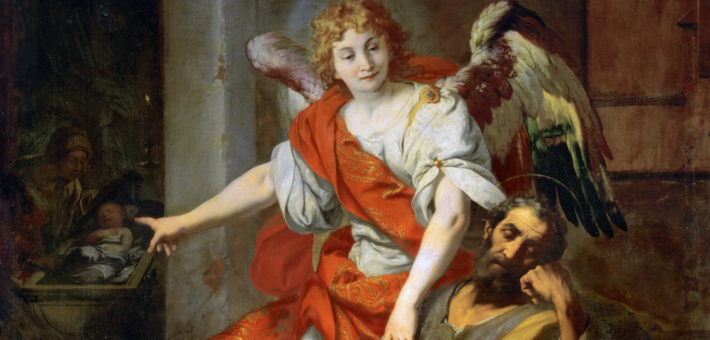Commentary on Hebrews 2:10-18
Christian prayer is the spiritual and mystical act of being incorporated into the life of the Son by the Spirit and coming before God the Father, being received as the Son, and speaking to the Father in the Name of Jesus, who intercedes on our behalf (Romans 8:15–16, 34). Enabled by the Spirit, we call out in the voice of the Son, “Abba! Father!,” being confirmed by the Spirit that we are children of God. As such, the privilege of prayer is participation in the eternal life of the Triune God through the communion of conversation.
Paul confirms even further that we are “caught up” in the divine embrace of God going to very God on our behalf. Just as the Son mediates for us (8:34), so the Spirit intercedes on our behalf in prayer (verse 26). We are graciously caught up in this inner-divine dialogue, sharing in the very life of God!
In Hebrews, we are invited to overhear this eternal conversation in the attribution of scriptural speech to the voice of the Son addressing the Father. The Son does so precisely as one who speaks to his family on behalf of God when he declares,
“I will proclaim your Name to my brothers and sisters;
in the midst of the congregation I will praise you”
(Hebrews 2:12; citing the Septuagint Psalm 21:23 [Hebrew text 22:22]),
and,
“I will put my trust in him”
(Hebrews 2:13a; citing Septuagint Isaiah 8:17; see also 12:2),
followed by speech directed up to God:
“Here I am and the children whom God has given me”
(Hebrews 2:13b; citing Septuagint Isaiah 8:18).
The privilege of communal reading of Scripture is an invitation to overhear the eternal divine conversation between the Father and the Son about how the gracious divine life invades and infuses the creation.
Previously in the text, we heard God speak to the Son, confirming his identity,
“You are my Son;
today I have begotten you”
(Hebrews 1:5a; citing Septuagint Psalm 2:7).
Contrasting the status of the angels to the superior status of the Son, in this scripturally attributed conversation, God even addresses the Son as “God”:
“Your throne, O God, is forever and ever,
and the scepter of righteousness is the scepter of your kingdom.
You have loved righteousness and hated lawlessness;
therefore God, your God, has anointed you
with the oil of gladness beyond your companions”
(Hebrews 1:8–9; citing Septuagint Psalm 44:7–8 [Hebrew text 45:6–7]).
God refers also to the Son as “Lord,” who is the very Creator:
“In the beginning, Lord, you founded the earth,
and the heavens are the work of your hands;
they will perish, but you remain […] you are the same,
and your years will never end”
(Hebrews 1:10–11a, 12b; citing Septuagint Psalm 101:26–28 [Hebrew text 102:25–27]).
None of the angels has been invited to share the throne of God’s rule:
“Sit at my right hand
until I make your enemies a footstool for your feet”
(Hebrews 1:13; citing Septuagint Psalm 109:1 [Hebrew text 110:1]).
Throughout this astonishing attribution, we are invited to hear God confirm the identity of Jesus the Son in the most exalted possible terms as one who uniquely shares in the identity of the one true covenant and creator God. The Son is the one who has acted as the great high priest performing the purification for sins and sitting down at the right hand of Majesty on high (Hebrews 1:3; 2:17).
This is the same Son proclaimed by Matthew’s Gospel as “Immanuel, God with us” (1:23; citing Septuagint Isaiah 7:14). It is this embodied presence of God who must flee as a vulnerable infant from the threat of the tyrant Herod, who seeks to destroy his life (2:13–15). Enraged at the refusal of the magi to be complicit in his scheme to eradicate his rival, Herod commits the atrocity of massacring all the children in and around Bethlehem who were two years old and younger, trying to stamp out any possible candidate who may have fit the description. Under the regime of this despotic king over Israel, Death swallowed up the innocent, thus evoking the convulsions of grieving parents.
Born into a world plagued by suffering, this Son himself is “perfected” as the “pioneer of … salvation … through suffering” (Hebrews 2:10). The Son who, we recall, was confirmed as God, who is enthroned in heaven and is the Lord Creator, is the same one who was “tested by what he suffered” (verse 18) and shared in the common struggle of humanity, staring down the nullifying abyss of death.
Death, and the devil who wields the power of death, is the great equalizer. With Death, all balances are zeroed out. All accomplishments are stripped from the adornment of every corpse. All achievements are mitigated, relegated, at best, to the memory of those who remain. All hopes are buried and absorbed into the composition of the dirt. Death threatens to quash the joyous vibrancy of humanity. Death enslaves God’s image-bearers in a crippling fear of one who reigns through the terror of corrosive eradication. Death threatens to silence all, regardless of whether we devote ourselves to good or evil ends.
We look around at those whom we love, and we know it is inevitable that we will join “Rachel “weeping for her children, [refusing] to be consoled, because they are no more” (Matthew 2:18b; citing Jeremiah 31:15 [Septuagint 38:15]).
Jesus, the Son, injects our miserable disease of mortality with the divine antidote of hope. Only because Jesus became “like his brothers and sisters in every respect,” serving as a “merciful and faithful high priest in the service of God so he could make a sacrifice of atonement for the sins of the people” (Hebrews 2:17), can we stare the enemy, Death, in the eye with courage, knowing that we will inherit the kingdom that cannot be shaken (12:28).
The enfleshment of God the Son, who entered into solidarity with us who are weak and oppressed by the one who has the awful power of death, is our hope. He is the one who leads the way to restore humanity’s vocation as those whom God “has crowned with glory and honor” (Hebrews 2:7b; citing Psalm 8:6b) to rule over creation on God’s behalf (Hebrews 2:8; see also Genesis 1:26–28). It is God the suffering and exalted Son who stands now as “the pioneer and perfecter of faith, who for the sake of the joy that was set before him endured the cross, disregarding its shame, and has taken his seat at the right hand of the throne of God” (12:2).
In the deepest of gratitude, let us now stand in solidarity with our Savior, consoling those who suffer, encouraging those who are tested, and pursuing the path of our high priest by approaching the throne of grace with humble boldness (Hebrews 4:14–16).



December 28, 2025